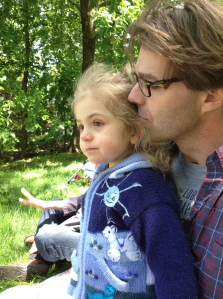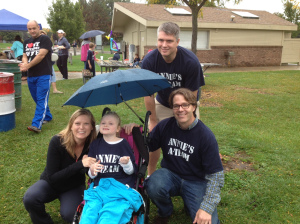It's Up To Us
Dear Friends,
A year ago today I started as program director for RSRT. I thought I would share a few reflections about the people I’ve met and what I’ve experienced and learned over that time.

Before starting at RSRT I had met two girls with Rett Syndrome—my own daughter and Monica’s daughter. Now, in my travels to events and meetings with families, I have met 47 girls and young women with Rett. Each of them, often despite terrible symptoms, has tried to engage me in some way, sometimes just through a flash of the eye or a smile. I met a teenage girl at an event who had been seizure-free for six months. But midway through the event she had a seizure. I watched as she trembled and her muscles seized; a single tear rolled down her cheek. Was it pain, frustration, fear? It was so clearly all of those. Her father and mother cried too. So did I. Of all I have learned and experienced over the last year, nothing sticks in my memory or keeps me awake at night like the faces of these girls and women and the strength I have seen in them and in their families. Our daughters have reminded me again and again without saying any words that it’s imperative that we change their lives.

I have also learned that it’s we—the families of girls and women with Rett—who are going to make this happen. We are the leaders in this cause. I’m not at all suggesting that we families have to throw money at this. I am well aware that we all have plenty on our plates; we have to live our lives, and the daily challenges of Rett Syndrome add emotional and financial stresses that most people don’t even have to think about. So we can’t be expected to shoulder the full burden of supporting Rett research on top of everything else. But, we all can make a critical difference by getting friends and contacts to support RSRT. Thanks to the efforts and outreach of some Rett families, many people who are not directly affected by Rett have generously and happily supported the research and have made it a priority for their giving. We, all of us families, have to continue and expand this outreach to our friends and contacts. Our daughters’ futures depend on it, and we all must get involved if we are to turn the possibility of a cure into a reality.
My respect for Monica and for RSRT as an organization, already great when I started, has only grown. I wanted to work for RSRT because I knew it did one thing and one thing only—supported research to find a cure. This is what I want. This is what we all want. I’ve worked in the non-profit world long enough to know that a 4% administrative cost rate is remarkable. The fact that RSRT spends 96 cents of every dollar directly on research is a reflection of its dedication, efficiency, and integrity. This is not an organization that is flashy or that spends a lot of time or money promoting its accomplishments; instead it focuses on finding a cure for Rett Syndrome. The result is, well, results. It is RSRT-supported scientists who are accumulating the knowledge needed to take the next steps in gene therapy and other promising approaches. I can talk about RSRT this way because I’m still new and in a way I’m looking from the outside in, as a parent. I have had nothing to do with this organizational culture myself; it is driven by Monica, by the RSRT trustees, and by the families that support us.
I have learned a lot about the science behind Rett Syndrome. I have much more to learn, but I know enough to say definitively that a cure is much more than a dream. It is a very realistic possibility. But it’s not going to happen unless we grow RSRT’s financial resources above and beyond the funds we raise from existing events. Money matters in scientific research. The more money RSRT has, the more resources it can put into projects like the Gene Therapy Consortium, and the faster and more efficiently these projects are likely to lead to a cure.
I know this has turned into a pitch—not for your dollars, but for your involvement. I am somewhat of a shy person by nature, so I guess I’ve also learned over the last year not to be shy about asking for help. There is so much to gain by it. We need more of you—as many Rett families as we can get—involved and supporting RSRT. Whether you are a parent, grandparent, aunt or uncle, cousin, or sibling—start an event of your own; support an existing event and get friends to join you; do a letter writing campaign. I know all of our lives are busy and full of the challenges of Rett Syndrome. If you can’t do a lot, do a little. But do something. It all makes a difference.
To all of you reading this who are involved already, this is a big thank you. None of what RSRT does would be possible without you.
I have one further thought. I know it's hard to consider ourselves fortunate. My wife and I often find ourselves asking why us—why did our beautiful, bright-eyed daughter get such a bad roll of the dice? But when I take a step back and look at the bigger picture, I see that we are very fortunate. We're fortunate that scientists have pinpointed the cause of Rett Syndrome; we're fortunate that Adrian Bird demonstrated that Rett is a reversible condition; we're fortunate that the best geneticists and neurobiologists in the world are now attracted to Rett research and are taking the next steps on Prof. Bird's discovery; we're fortunate that we have RSRT to lead, support, and push forward the science; and we're fortunate that we have a cause that speaks to people so compellingly and with so much promise. Most of all, we are fortunate to have our daughters; to love them and to be loved by them in such a profound and special way; and to see brightness in their futures.
I look forward to hearing from you. Thank you.
Tim Freeman
We need your help! With promising new research projects underway such as the Gene Therapy Consortium, now more than ever RSRT needs families affected by Rett Syndrome to get involved and raise funds. Here’s what you can do:
- Start a new event. Anyone can start an event—parents, grandparents, brothers and sisters, aunts and uncles. Events can be whatever you want them to be—a gathering in a home, a picnic in a park, or a big gala. We can help you with ideas and planning.
- If you live in an area that already has an RSRT event, please get involved. Come to the events and get friends to join you, ask for sponsorships, and donate auction items.
- Do a letter-writing campaign to your friends and contacts. This is easy to do, and we can help. Most people are thrilled to support our cause. But they need to learn about it and be asked. A thoughtful letter from you can do this. We can help you draft it and even mail it out for you.
- Raise funds online. This is easy and fun to do. Go to FirstGiving and click on “Start Fundraising.” You can do this for an occasion like a birthday or anniversary, for a run or a walk, or in honor or memory of someone.
We need all hands on deck. Rett research is poised for breakthroughs, but we need help from the entire Rett community. To get started, contact Tim at 609.309.5676 or tim@rsrt.org. Thank you!


